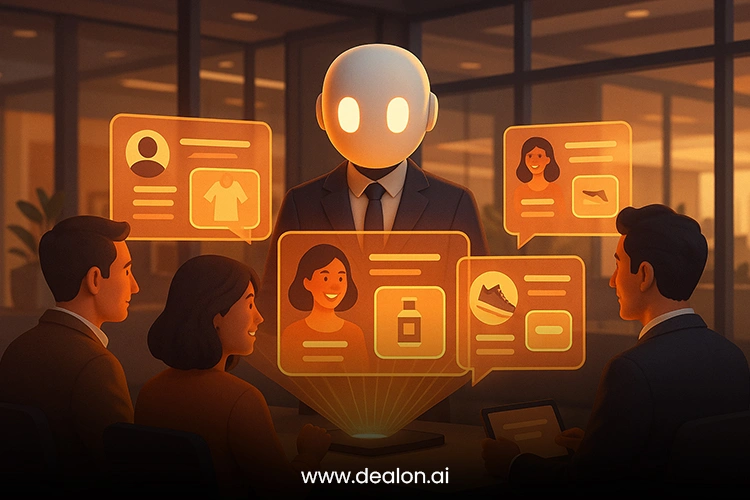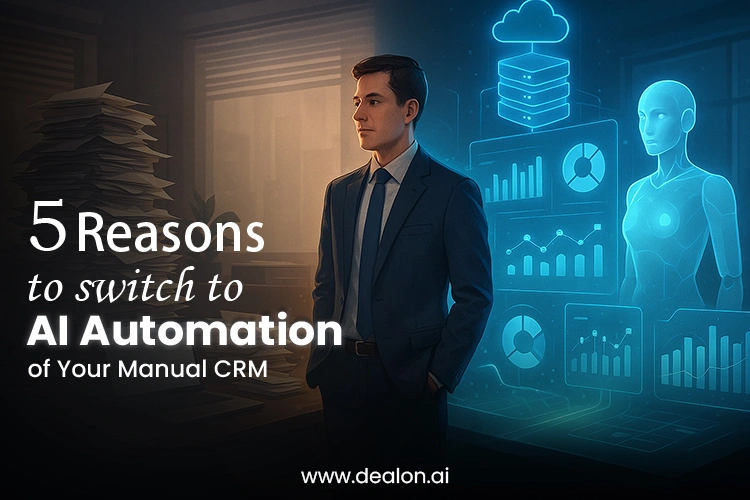The modern business environment is competitive, and to remain ahead, more than putting effort, innovation is necessary. Conventional, manual CRM systems- they were once the backbone of customer relationship management, but with the issue of modern technology, they are quickly on their way out. Step into the world of AI-driven CRM automation: an innovative resource that can streamline the process, improve productivity, and transform customer relationships.
Although human beings are ultimate, manual CRM systems by definition have the limitation of capacity and error, consisting of repetitive operations, like data entry, follow-ups on leads, and customer segregation. When their organizations grow in size, these systems tend to collapse under the augmented complexities, hence exposing businesses to inefficiencies, inaccuracies, and lost opportunities. AI, nevertheless, proposes a paradigm shift, developing the data into a manageable insight and accurately automating the time-consuming processes.
AI has led to a shift in the customer experience through intelligent CRMs that use ML to make predictions, as well as provide chatbots with real-time assistance capabilities. With the help of these systems, a company not only automates routine operations but also helps the organization to build personal interaction, establishing the atmosphere of customer appreciation and understanding. In addition, the scalability of AI can ensure that your CRM system will grow alongside your business, changing according to new challenges without the requirement of considerable resources.
With the ongoing digital revolution in the business world, moving on to the AI-driven CRM system is not a trend; it is a hallmark of keeping pace with the times, gaining an advantage, and building a strong customer relationship on a lasting basis. In the further discussion, we will examine five tips on why AI automation is not too late, but a strategic step towards ensuring the sustainable growth and success of the company.
Also Read: ChatGPT vs Jasper AI: Which is a Better Marketing Content Creator In 2025?
1. Improved Efficiency and Time Savings

A manual CRM system is a burden to businesses, and businesses have to devote hard work to carry out simple activities like adding data, making follow-ups, and maintaining customer records. These activities are time-consuming and susceptible to human error as your business increases. Manual systems are not automated, and this forces the employees to spend much time on routine activities, which do not contribute much to strategy. This has the effect of cutting work performance, possible supervision, and control opportunities that impact customer satisfaction and overall productivity.
American intelligent CRM systems, however, bring in a revolutionary change by making these mundane tasks automated. AI can automate the data entry process, the management and follow-ups of leads, and even automatic follow-up emails using well-constructed algorithms and machine learning capabilities. The behavioral and preference segmentation of customers can also be done without manual intervention, where AI can identify the right audience with minimal effort by the business. Automatization of the processes allows freeing up time that your team can devote to the important activities the company needs, such as the process of strategic planning, development of relationships, and providing innovative solutions to problems.
Additionally, the 24-hour capability of AI eradicates the presence of delays, which supports immediate response to customer questions, as well as improvement of real-time decision-making. This will make your team responsive to any queries and able to respond to a concern without undermining their administrative duties. When responsiveness to customers is one of the critical competitive assets in a particular industry, AI-advanced CRMs provide a unique advantage since there will be nothing left unnoticed and unresolved.
With companies incurring increased challenges and the expectations of customers becoming more complicated than ever, it becomes a necessary instrument for keeping pace with the trend through the application of AI-based CRM solutions to support the business. The time-saving efficiency sealed by automation provides optimal time utilization, a sense of agility, enabling an organization to scale higher and faster, and maintain a sustainable pace whilst reducing human error and increasing the overall customer satisfaction.
2. Informed Decision Making Using Data

Among other extraordinary benefits of using AI in a CRM system is that it can sift and process immense data volumes in real-time, through which companies can arrive at more sound and data-driven decisions. IC eliminates the need to rely on fixed data points and employ human interpretation that may take considerable amounts of time, with all the flaws associated with manual CRM management systems. This not only boosts the speed of the decision-making, but it also makes it very precise and accurate.
CRM AI also employs machine learning to analyze vast amounts of customer data, such as history of purchases, web viewing activity, and even social media activity. This information can be used to make real-time decisions using the AI to discern the hidden patterns and/or correlations that we may not discover otherwise. Considering an example, it may see what kind of product(s) or services have the chances of being liked by a specific category of customer, or when a customer is expected to buy something. One can utilize these insights to develop even more intimate and targeted marketing campaigns, leading to increased engagement rates and better conversion rates.
Additionally, AI helps to predict the needs of customers so the business can be proactive instead of reactive. AI can analyze the patterns, making accurate forecasts of future circumstances, including the possible customer loss or the appearance of a new preferences set, which means that the company will be able to change its approach beforehand, remaining above water. To be able to target their customers better, to optimize cross-selling potential, and to augment retention strategies, AI provides the results-based insight that spurs that growth.
The fact that they can make more intelligent decisions and pay little effort is an advantage to utilize in the dynamic business environment. The conclusion is that adoption of AI-powered CRM systems not only prepares businesses to understand more about their customers, but they will also predict and optimize operations and be at a competitive advantage in a more data-driven environment.
3. One-to-One Personalized Customer experiences at scale

Personalization has taken center stage in an increasingly competitive market space as an essential aspect of customer engagement. Experience customization since it builds better relations and encourages customer loyalty and lifetime value. They can easily scale up, thus enhancing personalisation efforts in comparison to manual CRM systems, where the level of customisation can be easily lost due to the sophistication and the amount of data they handle.
Using customer data to segment it according to customer behavior, demographics, and historical interactions, AI can help businesses implement hyper-targeted marketing. As opposed to conventional systems that always take on a more generic approach, AI considers individual preferences, interests, and purchasing behaviors of individual customers to make offerings and content radically relevant.
As an example, an AI may send tailored email campaigns with recommendations based on the previous purchases of the recipient or the suggestions that will be relevant to a person who browses the site. This degree of precision, which could hardly be provided manually, replaces the engagement rates and conversions by a significant margin.
In addition, the intelligent chat based on AI is also used to boost customer interaction in real-time in the form of intelligent chatbots and auto responses. Using these AI chatbots, it is possible not only to reply to queries, solve problems, and even inform customers about purchasing or going through the buying process, but also to match the preferences and habits of a person. This yields a cohesive and reactive experience that causes a greater feeling of engagement with the brand and also unloads the human agents of their repetitive duties.
With customer expectations increasing, AI-driven CRMs are well on their way to becoming the solution to scale relative to personalization efforts. Businesses can develop more loyal customers by creating highly contextual and context-driven interactions at each touch point, and therefore improve customer satisfaction, which builds brand loyalty as well. It leads to a more active and fulfilled customer base and improved conversion rates, all courtesy of the magical ability of automation and advanced AI features.
4. Easy to Integrate with Other Business Tools
The impeccable capability to integrate smoothly with an extensive range of business tools and platforms is one of the most attractive traits of AI-based CRM systems. Such a capability to integrate provides a complete and connected ecosystem, making sure that information is free to move between different departments like marketing, sales, and customer support. In removing silos and allowing a centralized method of managing customers, the AI-driven CRMs make it more effective to work on the job, fuelling resource usage and, eventually, business performance.
To give an example, integration of your CRM with marketing automation systems would enable you to track the customer interaction with different campaigns on a more granular level. AI can interpret such interactions instantly and give insights into how recipients react to emails, adverts, or even content on social media.
The feedback loop provides marketing teams with the ability to alter the campaigns in real-time so that they can stand a better chance of increasing targeting, message timing, and relevancy of the content. Relating this data to your CRM, AI will make sure that every interaction with the customers will be monitored in a single system, which will allow fine-tuning the strategies and make the marketing activities more profitable.
On the same note, AI integration can be connected with the sales and support systems and give a 360-degree picture of the customer journey. The teams involved in sales can gain insights about how customers behave, what they like, and what their tendencies are, as well as how companies interacted with them in the past, thus being able to personalize this interaction and seal the transaction. Support teams, however, will be able to access helpful information concerning the history of the customer and provide efficient, speedy service to the customer based on their requirements. What is generated as a result is a streamlined service to customers, at all points of touch, driven by current and valid information.
5. Future-proofing via Scalability and Adaptability Growth
With the growth of any business, a flexible and scalable CRM system is a must. Manual, traditional CRMs usually cannot maintain the pace of development. The growing nature of customer data and interaction requires a large workforce to operate and sustain the system, which in turn increases the costs, inefficiencies, and possibly bottlenecks. Contrastingly, CRM automation AI is intrinsically scalable in its setup to manage an increase in data and workflows that are more complex relative to this scale with impressive ease. Such scalability permits companies to increase up to a range, but not commensurate with the rise in resource allocation, and is thus sustainable in the long term without the prospect of the system becoming overloaded.
The AI-based CRMs can expand and contract with your business requirements. Unlike manual systems, which are set out once and require tedious and resource-consuming updates or, in some cases, wholesale redesigning, AI systems learn as they go. The more the system gets fed with information, such as the interactions and behavior of customers, in addition to gaining feedback, the more efficient and accurate the AI is in terms of forecasting. This capacity to learn and change as time progresses implies that your CRM will be capable of foreseeing change in the market, customer preferences, and trends, which manual systems can never provide.
Regardless of entering new markets, introducing new products, or promoting the engagement of more people as customers, an AI-wise CRM may adapt to new demands with ease. You can tailor the system to fit right into new channels, touchpoints, or business units so your operations become seamless and able to respond to your business. It is this flexibility that will guarantee that your CRM solution will remain relevant and valuable to your business, regardless of how complex or dynamic it grows.
The AI-driven CRM applications have the flexibility and scalability to support businesses in the short and long term in a dynamic business landscape, where it is anticipated that changes will benefit the organization. This allows businesses to make their CRM operations more future-proof, meaning that they have to be more fit and adaptable to changes that may come with their growth and development by tapping into the AI inherent flexibility.
Conclusion
The move towards AI-driven automation after using a manual CRM is a business strategy that opens unreal potential regarding business growth and efficiencies. By automating tasks and boosting the productivity of the working team, equipping the company with data security to personalize customer experience on a large scale, there are no limits to the advantages that AI-powered CRMs can bring to the company.
Being able to produce real-time data-driven insights and integrating with the rest of the tools used in business seamlessly, AI systems guarantee a cohesive operation that is agile. As a company grows, AI-based CRM adapts to that growth and can be more scalable and adaptable, as manual systems cannot be. Implementing AI CRM automation makes the company ready to survive in the long run in a highly competitive and data-driven environment.

